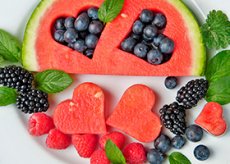New publications
Berries serve as an excellent preventive measure against cancer
Last reviewed: 02.07.2025

All iLive content is medically reviewed or fact checked to ensure as much factual accuracy as possible.
We have strict sourcing guidelines and only link to reputable media sites, academic research institutions and, whenever possible, medically peer reviewed studies. Note that the numbers in parentheses ([1], [2], etc.) are clickable links to these studies.
If you feel that any of our content is inaccurate, out-of-date, or otherwise questionable, please select it and press Ctrl + Enter.

The berries are rich in anthocyanins – components that can be used as a therapeutic and prophylactic agent to prevent the development of cancerous tumors and slow down the aging process.
American and Finnish pharmacists have recently come to such conclusions. Pigment substances – anthocyanins – are contained in many berries, for example, in blueberries, cranberries, blackberries, raspberries. Such substances belong to the category of flavonoids and have a powerful antioxidant effect. Experts claim that anthocyanins are able to protect people from many dangerous diseases, including atherosclerosis, heart failure, heart attack, cerebrovascular accident, diabetes. It turns out that we are talking about quite promising drugs, which, unfortunately, have not been studied enough yet.
For several years, oncologists have carefully studied the effect of berries on the prevention of cancer. As a rule, testing new drugs on rodents instilled hope, but long-term tests on humans did not live up to expectations. And only recently have scientists come closer to the truth.
Experts have studied the effect of anthocyanins on enzymes that influence cell aging and their malingification - among such enzymes, Sirtuin 6 is especially relevant, regulating gene activity and preventing malignant cellular transformation.
With age-related changes, Sirtuin 6 loses its functionality, which allows the disease to develop.
Until now, this enzyme has been studied less than others. It was believed that it has a significant role in carbohydrate metabolism and preventing the development of diabetes.
A group of experts led by Minna Ranasto-Rilla encountered the curious abilities of cyanidin. We are talking about anthocyanin, which is present in berries such as raspberries, blueberries and cranberries. Experimentally, it was possible to find that cyanidin increased the indicators of cellular production of Sirtuin 6 by 55 times. In the same way, anthocyanin suppressed the activity of oncogenes, potentiating the antitumor gene. To put it simply, the berry component is capable of becoming a killer in relation to malignant cellular structures.
So far, scientists cannot say for sure whether cyanidin will be able to overcome the acidic environment of the stomach and perform the important function assigned to it. Of course, it would be very nice if a berry diet could become a full-fledged prevention of cancer. If it turns out that anthocyanins are damaged in the acidic environment of the stomach, then pharmacologists will have a new task: to improve and perfect their absorption by the human body.
For now, one thing can be said for sure: a thorough study of the survival abilities of cancer cells will sooner or later lead scientists to a solution to the problem of deadly diseases. Sirtuin 6 and drugs that regulate the activity of oncogenes will become a new stage on the path to victory over oncopathologies.
The research is described in detail in the pages of Scientific Reports.

 [
[